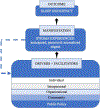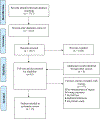Adapting the Health Stigma and Discrimination Framework to understand the association between stigma and sleep deficiency: A systematic review
- PMID: 35504839
- PMCID: PMC9233012
- DOI: 10.1016/j.sleh.2022.03.004
Adapting the Health Stigma and Discrimination Framework to understand the association between stigma and sleep deficiency: A systematic review
Abstract
Objective: Sleep deficiency and sleep disorders disproportionally affect socially disadvantaged and marginalized individuals and groups. Recent evidence suggests that stigma, a social process characterized by labeling, stereotyping, and prejudice, is associated with sleep characteristics.
Purpose: Guided by the Health Stigma and Discrimination Framework, the purpose of this systematic review is to describe associations between dimensions of stigma and sleep deficiency and to identify future directions for research.
Methods: We searched the OVIDPsycINFO, OVIDEMASE, OVIDMEDLINE, and CINAHL databases for empirical research studies that reported relationships between the 3 dimensions of stigma-internalized, perceived, and anticipated-and characteristics of sleep deficiency-duration, continuity/efficiency, timing, alertness/sleepiness, quality, and disorders.
Results: Of 1717 articles, 15 met our inclusion criteria. The most frequently assessed dimensions of stigma were internalized and perceived stigma. Characteristics of sleep deficiency were measured by self-report and included sleep quality, duration, trouble sleeping, and insomnia symptoms. We found consistent evidence that stigma, whether internalized, perceived, or anticipated, is associated with self-reported characteristics of sleep deficiency.
Conclusions: This evidence base can be further strengthened with prospective studies that incorporate both multidimensional measures of stigma and objective measures of sleep characteristics. We outline research implications that can clarify underlying mechanisms and more precisely define the relationships between stigma and sleep and inform interventions to address stigma, improve sleep, and reduce the health inequities that disproportionately affect individuals from socially disadvantaged and marginalized groups.
Keywords: Systematic review; health disparities; sleep; stigma.
Copyright © 2022 National Sleep Foundation. Published by Elsevier Inc. All rights reserved.
Figures
References
-
- The State of SleepHealth in America. https://www.sleephealth.org/sleep-health/the-state-of-sleephealth-in-ame.... Published 2020. Accessed August 18, 2020.
Publication types
MeSH terms
Grants and funding
LinkOut - more resources
Full Text Sources
Medical
Miscellaneous



